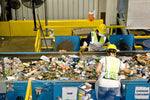
Plastic Waste and the Circular Economy Dilemma
, by Planet Green, 2 min reading time

, by Planet Green, 2 min reading time
That familiar mantra "reduce, reuse, recycle" is all to commonly heard in the efforts to combat plastic pollution, but the prioritization of these actions remains a subject of public and political disagreement. In the pursuit of a circular economy, where materials never become waste, the challenges surrounding global plastic waste issues still persist. Despite global initiatives and proposed UN treaties, finding a balance between reducing plastic production and promoting recyclability comes with significant hurdles.
Consumer awareness has led to an increase of better choices including rejecting plastic straws and bags, yet the sheer economic allure of plastic, driven by its low cost to produce, and high versatility, prevails. The environmental consequences are severe, with an unacceptable three-quarters of the 460 million tonnes of global plastic production in 2019 ending up as waste. Some 22 million tonnes leaked into the environment, exacerbating the plastic pollution crisis.
While politicians and businesses advocate for the “circular economy” as the solution, differing interpretations hinder potential solutions. Vito Buonsante, a Brussels-based environmental health lawyer, contends that true circularity for the plastics industry involves following resource efficiency principles, a challenging effort considering the subsidies given to fossil fuels and the complexity of recycling so many different types plastic products.
Plastics' diverse properties are achieved through a cocktail of over 13,000 chemicals, with more than 3,200 of those chemicals considered hazardous to human health, and the environment. This complexity hinders reuse, disposal, and recycling efforts. Bethanie Carney Almroth, a professor at the University of Gothenburg, emphasizes the need to prioritize “reducing the production of toxic plastics” for a safer and more circular approach.
The process of mechanical recycling, which involves sorting, shredding, and melting plastic into pellets, faces limitations. Concerns about pollution and energy use raise questions for chemical manufacturing, an alternative process to mechanical recycling. The claims of infinite recyclability are questioned, as plastic degrades over multiple cycles and needs the addition of virgin material to maintain quality.
International efforts to address the plastics problem gained momentum with the UN's resolution to establish a binding agreement by 2024. However, opposing opinions clashed during negotiations in Nairobi, with some advocating for a reduction in production and others putting an emphasis on recycling, reflecting the challenges faced by oil-producing nations.
The proposed UN treaty has potential to reshape the world's relationship with plastic. Stakeholders, including brands like Unilever, Nestlé, and many other major consumer brands, envision a circular economy where plastic never becomes waste. By reducing plastic production, promoting reuse, and shifting away from single-use plastics, a Global Plastics Treaty aims to significantly reduce plastic pollution by 2040. Until that time, the environment suffers.
Despite positive initiatives, talk is cheap and systemic change is imperative. It requires collaboration and regulation. Reuse and refill business models underscore the importance of industry-wide transformation, however, consumer behavior plays a crucial role in plastic waste reduction. Incentives, compelling user experiences, and value propositions to make refill and reuse more convenient are also considerations to help change the habitual actions of a single-use society.

When people talk about e-waste, the conversation usually centers on big-ticket items: cell phones, laptops, televisions, or kitchen appliances. But one of the most common...

Most people see a printer cartridge as a small, everyday item. But behind that small piece of plastic is a surprisingly large environmental cost. Every...

The phrase “circular economy” has become a buzzword in sustainability circles, but what does it really mean? In simple terms, it’s about designing products and...

For years, recycling ink cartridges often meant relying on office collection bins, retail drop-off points, or corporate programs tied to large accounts. But as more...